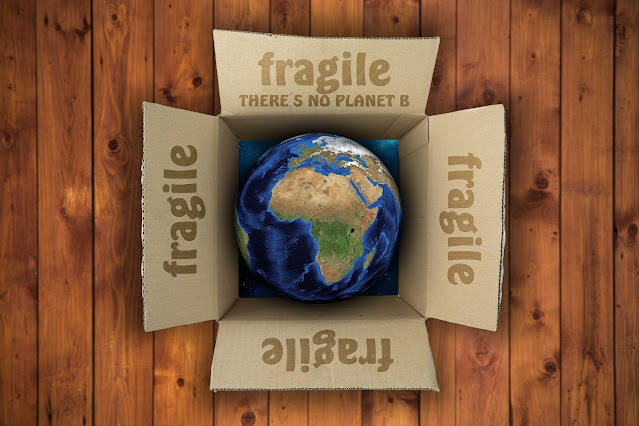Restoring Earth's Equilibrium: A Call to Action on Man-Made Global Warming
"Embracing a plant-based diet and advocating for resourceism are powerful individual actions to combat climate change. They pave the way towards a sustainable future for our planet."
Imagine a washing machine, diligently churning away, keeping our clothes clean and fresh. However, as sometimes happens, the machine's load becomes imbalanced, causing it to vibrate violently, endangering its own existence. This analogy mirrors the precarious state of our planet's environment. The equilibrium of Earth's climate has been disrupted by the rapid and unprecedented activities of humanity. Man-made global warming has set off a chain reaction of events that threaten the very fabric of our ecosystem. It is imperative that we act swiftly and decisively to restore this equilibrium before irreversible damage occurs.
Advocating for a transition to a moneyless, global socioeconomic system like Resourceism is imperative. This paradigm shift away from money-based systems, such as Capitalism, is crucial for a sustainable and equitable future.
Just as an imbalanced load causes a washing machine to malfunction, the excessive release of greenhouse gases into the atmosphere has disrupted the delicate balance of our planet's climate. The burning of fossil fuels, deforestation, and industrial processes have exponentially increased the concentration of carbon dioxide and other greenhouse gases in the atmosphere. This unchecked emission is akin to piling on more clothes in an already off-kilter washing machine.
The Vibrations of Disruption
The consequences of this disruption are already reverberating across the globe. We witness extreme weather events with increasing frequency and intensity: hurricanes, droughts, wildfires, and floods. Rising sea levels threaten coastal communities, and biodiversity is plummeting as habitats become inhospitable. The vibrations of an imbalanced climate are felt by every living being on Earth.
The Tipping Point: Approaching Environmental Catastrophe
Continued inaction will push our planet closer to the brink of catastrophe. Like a washing machine teetering on the edge of destruction, our environment risks irreversible damage. The polar ice caps are melting, disrupting ocean currents and endangering countless species. The loss of biodiversity threatens the stability of ecosystems that support life as we know it. The time to act is now, before we witness the irreversible consequences of our inaction.
Restoring Equilibrium: A Collective Responsibility
Restoring Earth's equilibrium requires a collective effort. Governments, industries, and individuals must work together to reduce emissions, transition to sustainable energy sources, and implement conservation efforts. We must invest in innovative technologies, promote sustainable practices, and prioritize the preservation of natural habitats.
Conclusion: A Future Balanced and Sustainable
Just as we strive to balance the load in a washing machine, we must work tirelessly to restore equilibrium to our planet's environment. Man-made global warming is not an insurmountable problem, but it demands immediate and sustained action. By recognizing our shared responsibility and acting in unison, we can ensure a future where Earth thrives, and all its inhabitants prosper. The time for action is now, for the sake of our planet and future generations.
Afterword: A Call to Individual Action
In our collective endeavor to restore Earth's equilibrium, every individual plays a crucial role. One of the most impactful steps we can take is adopting a plant-based diet. This choice not only benefits our health but also reduces the demand for resource-intensive animal agriculture, a significant contributor to greenhouse gas emissions. By embracing plant-based living, we can significantly lessen our carbon footprint and contribute to a more sustainable future.
Additionally, we must consider alternative economic models like resourceism, which prioritizes the responsible management and allocation of resources. This approach encourages us to utilize resources efficiently, reduce waste, and transition towards renewable and circular economies. By embracing resourceism, we can create a more balanced and sustainable world, one that prioritizes the well-being of both people and the planet.
As we move forward, let us remember that every action, no matter how small, contributes to the larger effort. By adopting conscious choices in our daily lives, advocating for policy changes, and supporting sustainable initiatives, we can collectively restore Earth's equilibrium. Together, we hold the power to not only halt the destructive course of man-made global warming but to forge a path toward a thriving and harmonious future for all.
Resources
Climate Change:Intergovernmental Panel on Climate Change (IPCC)
Website: https://www.ipcc.ch/National Aeronautics and Space Administration (NASA) - Climate Change
Website: https://climate.nasa.gov/World Meteorological Organization (WMO) - Climate Services
Website: https://public.wmo.int/en/our-mandate/climate/climate-services
Plant-Based Diets and Climate Change:
Food and Agriculture Organization (FAO) - Livestock's Long Shadow
Report: http://www.fao.org/docrep/010/a0701e/a0701e00.htmThe Carbon Footprint of 5 Diets Compared
Study: https://journals.plos.org/plosone/article?id=10.1371/journal.pone.0081643The Guardian - How to Eat: The Pleasures and Principles of Good Food
Article: https://www.theguardian.com/lifeandstyle/2019/may/11/how-to-eat-pleasures-principles-good-food
Resource-Based Economy:
The Venus Project
Website: https://www.thevenusproject.com/Resource-Based Economy - Wikipedia
Article: https://en.wikipedia.org/wiki/Resource-based_economyThe Zeitgeist Movement
Website: https://www.thezeitgeistmovement.com/

